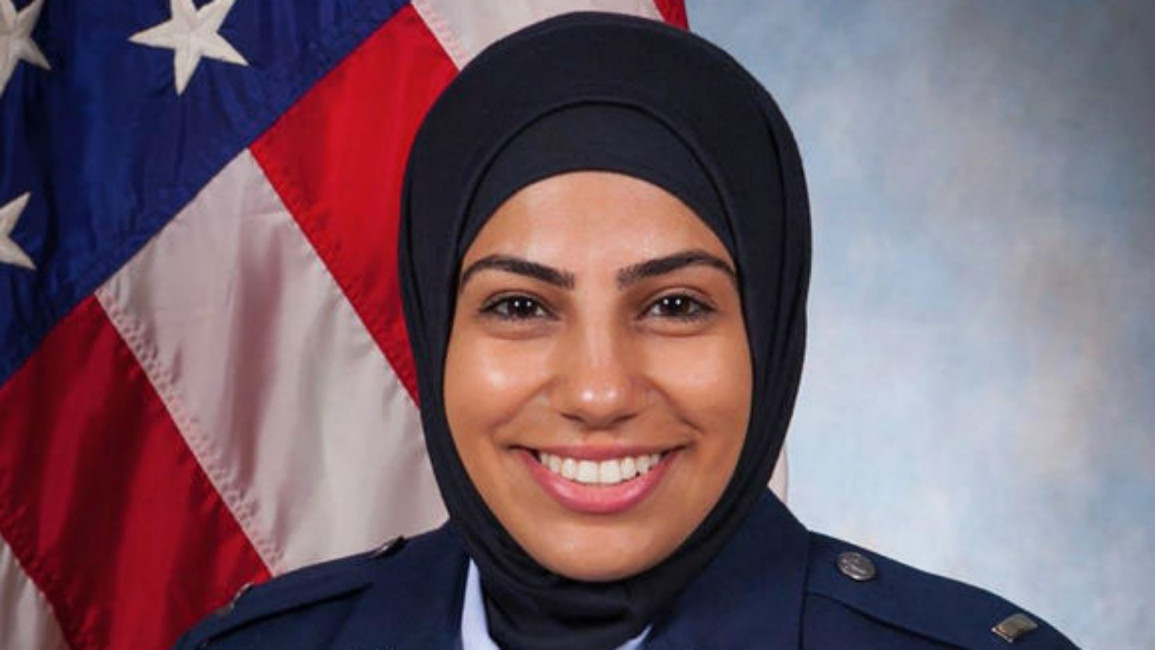US Air Force officially allows pilots to wear hijabs, turbans, beards
US Air Force officially allows pilots to wear hijabs, turbans, beards
The US Air Force has updated its dress regulations and pilots will now be able to apply for a waiver to wear a beard, hijab or turban on religious grounds.
2 min read
Maysaa Ouza was the first to be permitted to wear a headscarf [ACLU/Maysaa Ouza]
The United States Air Force on Friday formally permitted its pilots to wear a hijab, turban or beard for religious reasons.
The update to the Air Force's code for "dress and personal appearance" will allow airmen to ask for a waiver to wear religious apparel.
The apparel has to be "neat and conservative" and present a professional appearance, according to Air Force Times.
If such a waiver is filed, it can only be denied if the policy "furthers a compelling government interest".
Several pilots have been given permission to wear beards, turbans or headscarves for religious reasons in the past.
Staff Sergeant Abdul Rahman Gaitan was the first Muslim pilot to receive a beard waiver for religious reasons in 2018, according to Air Force Times.
Captian Maysaa Ouza followed suit as the first hijabi to be an Air Force Judge Advocate General Corps officer. Ouza, who is originally Lebanese, featured in a NBC documentary last year.
In June last year, Singh Bajwa was the first Sikh pilot allowed to wear a turban, beard and long hair.
Air Force regulation states that beards must be no longer than two inches, and has to be rolled or tied if longer.
Headscarves must resemble the pilot's uniform, typically in colours such as black, brown, green or blue.
Read more: There is more to Muslim women than headscarves and World Hijab Day should show that
The move comes amid anti-Muslim from the White House. Just last month, the Trump administration widened its so-called "Muslim ban" to include those travelling from the countries Kyrgyzstan, Myanmar, Eritrea, Nigeria, Sudan and Tanzania.
Trump's ban sparked an uproar, with massive protests across the nation and chaos at airports where passengers were detained.
The current ban suspends immigrant and non-immigrant visas to applicants from the affected countries, but it allows exceptions, including for students and those who have established "significant contacts" in the US.
And it represents a significant softening from Trump's initial order, which had suspended travel from Iraq, Iran, Libya, Somalia, Sudan and Yemen for 90 days, blocked refugee admissions for 120 days and suspended travel from Syria.
Follow us on Twitter and Instagram to stay connected
The update to the Air Force's code for "dress and personal appearance" will allow airmen to ask for a waiver to wear religious apparel.
The apparel has to be "neat and conservative" and present a professional appearance, according to Air Force Times.
If such a waiver is filed, it can only be denied if the policy "furthers a compelling government interest".
Several pilots have been given permission to wear beards, turbans or headscarves for religious reasons in the past.
Staff Sergeant Abdul Rahman Gaitan was the first Muslim pilot to receive a beard waiver for religious reasons in 2018, according to Air Force Times.
Captian Maysaa Ouza followed suit as the first hijabi to be an Air Force Judge Advocate General Corps officer. Ouza, who is originally Lebanese, featured in a NBC documentary last year.
In June last year, Singh Bajwa was the first Sikh pilot allowed to wear a turban, beard and long hair.
Air Force regulation states that beards must be no longer than two inches, and has to be rolled or tied if longer.
Headscarves must resemble the pilot's uniform, typically in colours such as black, brown, green or blue.
Read more: There is more to Muslim women than headscarves and World Hijab Day should show that
The move comes amid anti-Muslim from the White House. Just last month, the Trump administration widened its so-called "Muslim ban" to include those travelling from the countries Kyrgyzstan, Myanmar, Eritrea, Nigeria, Sudan and Tanzania.
Trump's ban sparked an uproar, with massive protests across the nation and chaos at airports where passengers were detained.
The current ban suspends immigrant and non-immigrant visas to applicants from the affected countries, but it allows exceptions, including for students and those who have established "significant contacts" in the US.
And it represents a significant softening from Trump's initial order, which had suspended travel from Iraq, Iran, Libya, Somalia, Sudan and Yemen for 90 days, blocked refugee admissions for 120 days and suspended travel from Syria.
Follow us on Twitter and Instagram to stay connected


![President Pezeshkian has denounced Israel's attacks on Lebanon [Getty]](/sites/default/files/styles/image_684x385/public/2173482924.jpeg?h=a5f2f23a&itok=q3evVtko)



 Follow the Middle East's top stories in English at The New Arab on Google News
Follow the Middle East's top stories in English at The New Arab on Google News


